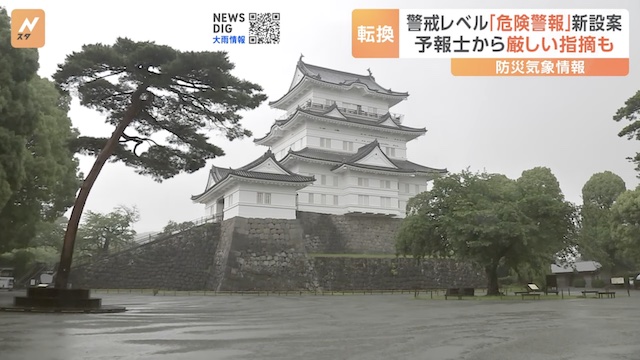TOKYO, Jun 18 (News On Japan) - The Japan Meteorological Agency (JMA) is set to undergo a significant overhaul of its disaster weather information, with experts proposing the introduction of a new 'Danger Alert' between the existing 'Special Warning' and 'Warning' categories. The final report on this review was compiled on Tuesday.

Currently, the JMA's disaster information, described as 'complex and confusing,' includes alerts for linear precipitation bands, typhoons, and guerrilla heavy rains. As Japan enters its peak rainy season, important discussions are ongoing about revamping the 'Disaster Weather Information' system, which highlights the risk of natural disasters through various warnings and advisories.
The current system is criticized for its complexity. For instance, both flood and landslide warnings are classified under 'Alert Information,' but flood alert is level 3, while landslide alert is level 4. This discrepancy means that despite similar names, the required safety actions differ.
After over two years of discussions, experts have finalized a report addressing these issues. The proposal standardizes disaster-related information into four categories, such as 'flood' and 'landslide,' and aligns warning levels accordingly. For example, flood information would be uniformly categorized under 'flood,' with common terminology across levels like 'level 5 Special Warning' and 'level 2 Advisory.'
Additionally, the proposal introduces a new 'Danger Alert' at level 4, which previously lacked consistency.
Katsuya Yamori, chair of the review committee, stated, 'We have achieved a unified expression format. This is a significant step towards simpler and more understandable expressions.'
However, some meteorologists have voiced concerns. Akira Mori, a meteorologist, remarked, 'The term "Danger Alert" might not be immediately clear to the public. It seems inappropriate.' He further warned that creating a new alert level above 'Warning' could dilute the sense of urgency associated with current warnings.
Mori explained, 'Warnings are issued when there is a risk of a major disaster. They are already serious enough. Adding another level above might lead people to think "it's just a warning" and not take it seriously.'
The JMA aims to make these changes to ensure clearer communication of imminent dangers and appropriate safety actions. They plan to implement the revised system in two years, based on today's report.
Source: TBS















